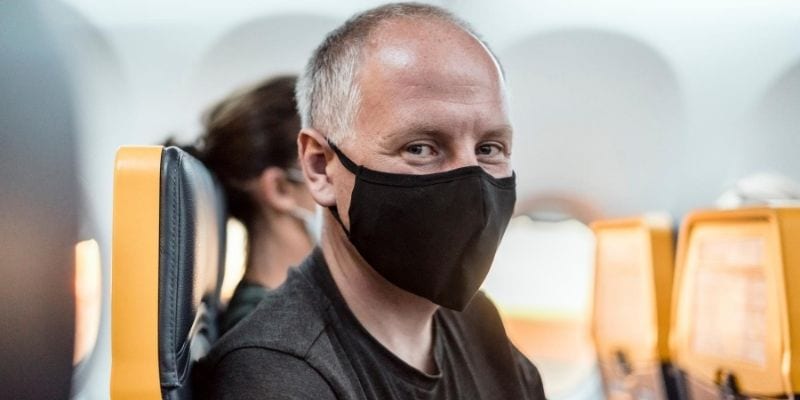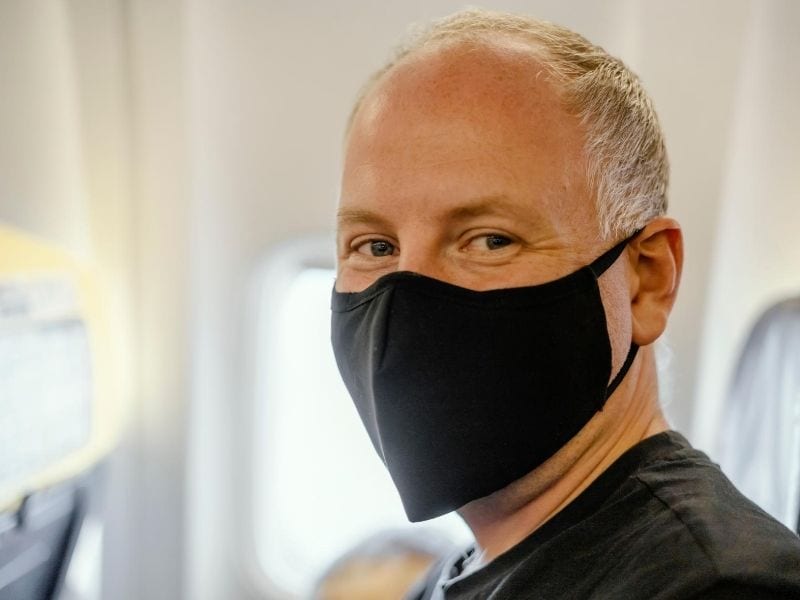So, you just got back from a trip where you may or may not have been exposed to COVID-19? Do you need to self quarantine after flying? What’s the protocol after a trip in the coronavirus era? We examine these questions and more using CDC guidance on what to do after flying.
I recently completed my first business trip since early March and after many months sheltering in place it was absolutely lovely to get back out on the road. But, now that the trip is in my rear view mirror what’s the proper protocol? You, like me, may have many questions about what to do and how to behave after traveling in the era of the coronavirus.
Some of the questions or concerns you or your loved ones may have include:
- Do I have to self quarantine after flying these days?
- How do I keep my family safe when I return from a trip?
- Do I need to get tested after a trip? Every trip?
- Do I need to wear a mask around my house?
- Can I hug my kids or spouse after returning from a trip?
- My spouse is anxious about getting infected by from me
- I have a higher risk member of my family at home, should I take extra precautions to minimize the risk of transmission?
- Should I avoid leaving my house for 2 weeks after I get back from a trip?
- What travel restrictions does my country, state, county or city have when returning from a trip?
These are just some of the questions you or your loved ones might have in the face of this deadly pandemic. Fortunately, the Centers for Disease Control (CDC) has provided specific guidance about many of these situations. Moreover, this information, when coupled with local guidance, can help you understand how to deal with life after your travel.
How does the coronavirus spread?
It’s important to understand how the coronavirus is transmitted. According to the latest guidance, the primary means by which the coronavirus is transmitted is through person-to-person transmission. Specifically, they note that the virus can be transmitted:
-Between people who are in close contact with one another (within about 6 feet).
CDC Guidance
-Through respiratory droplets produced when an infected person coughs, sneezes or talks.
-These droplets can land in the mouths or noses of people who are nearby or possibly be inhaled into the lungs.
-Some recent studies have suggested that COVID-19 may be spread by people who are not showing symptoms.
When traveling, you are increasing your exposure to other persons than you might when sheltering in place – persons who may be carrying the coronavirus. While airlines, hotels and rental car agencies have taken great care to reduce the risk of transmission (including requiring face masks pretty much everywhere and extended cleanings) you are, by definition, increasing your chances to getting ill when traveling.
To be fair, there is some debate at just how much you increasing your risk – especially if you take necessary measures like wearing a face mask, wiping down surfaces of rental cars and hotels, washing your hands frequently, etc.
CDC Guidance for after you Travel

According to the CDC, you pose a risk to your family, friends, coworkers and community for 14 days after you are exposed to the virus. The CDC’s guidance for what to do after your travel (and if you believe you’ve come into contact with someone who’s been infected) is simple:
- Stay home as much as possible
- Wear a mask
- Wash your hands frequently
Employ these measures for at least 14 days after your trip. For example, on my recent trip I believe I may have been exposed to someone with coronavirus. As such, I’ve been wearing face mask around my house to reduce the chances of transmitting it to my kids.
I’ve chosen to minimize my contact with my family and have been washing my hands more frequently than normal. These measures are probably overkill, but with a family member at home who’s got a somewhat higher risk, I’ve decided to be extra cautious.
I am also awaiting test results to confirm if I have been infected. While I am currently showing no symptoms, I am taking these measures out of an abundance of caution for my family. According to the CDC, symptoms may occur within 2 days of infection.
You do not need to get tested after every trip – especially if you are not showing symptoms or don’t think you’ve been exposed, although doing so won’t harm.
Lastly, if you become ill, definitely go get tested. Early signs of illness often include a fever. See more symptoms here.
Read the full CDC guidance here
Local Guidance
Depending on where you live and where you were traveling you may actually be required to self quarantine for some period of time. Local guidance varies wildly depending the country, city, state and county you reside in or visited. It’s best to check for current guidance with those respective agencies to ensure you are compliant.
How to stay safe while you are traveling
Knowledge is key. While traveling does increase your chances of becoming infected with the coronavirus, travelers don’t need to be afraid. Visiting the grocery store increases your chances of getting ill too. If you take the proper precautions travelers can greatly reduce their chances of becoming infected. These measures include:
- Wearing a face mask in public settings
- Washing your hands frequently with warm water and soap
- Using hand sanitizer when appropriate
- Avoid touching your face or eyes
- Wiping down surfaces
- Avoid being near people who are known to have the coronavirus
This bug is nasty, but with the proper measures in place, travel can be done relatively safely. Be sure to consult a health professional for specific instructions related to your unique health situation.
Final Thoughts on Traveling in the COVID-19 Era
Traveling in the COVID-19 era is definitely weird. It’s bizarre to wear a face mask on an airplane. It’s weird to take a customer meeting where everyone’s wearing masks, taking their temperature and not shaking hands. It’s a little unnerving too.
Generally speaking, travel should still be limited as much as possible. For the most part, guidance still suggests that only essential travel should be undertaken. That said, travel can be undertaken in a safe manner and if you are concerned when you return, use the measures we’ve shared here to reduce your chances of transmitting it to someone else.
- Note: We are not health professionals. The advice provider herein does not constitute health advice. As always, consult a medical professional for detailed instructions.
Like many of us, you are probably struggling to find your new normal. Perhaps you’ve done that and are simply bored. We’ve got your back. Here’s a ton of recent content that revolves around what’s facing us today, including working from home ideas, what to watch, things to read, and how to avoid boredom. Enjoy.


1 comment
As travel is starting we need to follow some precautionary measures that we need to wear masks, use proper sanitizers. Wash our hand again and again after some time also if we filling sick then we must avoid traveling. These are some main measures which we need to follow.
Also if possible please self quarantine yourself if you are travelling from Red Zones which is created by the Government. Because it helps you and your family to stay away from Covid-19